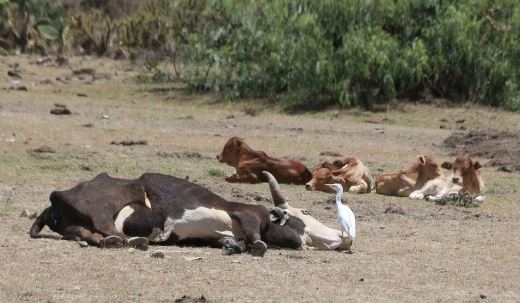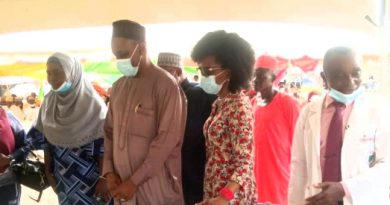CONFIRMATION OF FIRST ANTHRAX CASE IN NIGERIA… FG plans nation wide vaccination
Oru Leonard
The Federal Ministry of Agriculture and Rural Development has announced the existence of anthrax as the first case was confirmed in Niger State, Nigeria.
In a public statement made by Dr Columba T. Vakuru, Chief Veterinary Officer of Nigeria, he notified
of animals manifesting symptoms of suspected case of anthrax in a farm in Suleja,Niger State.
According him, “The case was in a multi-specie animal farm comprising of cattle, sheep and goats located at Gajiri, along Abuja-Kaduna express way Suleja LGA Niger State, where some of the animals had symptoms including oozing of blood from their body openings -anus, nose, eyes and ears.
“A Rapid Response team comprising of federal and states One Health Professional Team visited the farm to conduct preliminary investigations and collected samples from the sick animals. Subsequent laboratory tests by the National Veterinary Research Institute laboratory confirmed the diagnosis, marking the first recorded case of anthrax in Nigeria in recent years and after the report of an outbreak of anthrax in Northern Ghana few weeks ago. All animals affected have died.
Anthrax is caused by the spore-forming bacterium Bacillus anthracis, which primarily affects animals such as cattle, sheep, and goats but can also infect humans who come into direct contact with infected animals or contaminated animal products, such as meat, wool, or hides. Inhalation anthrax may occur through the inhalation of spores,
while cutaneous anthrax can result from contact with contaminated materials or
through open wounds.
The Federal Government, through the Federal Ministry of Agriculture and Rural
Development in collaboration with the Niger state government has taken proactive measures to ensure the outbreak is controlled and contained quickly in Nigeria. This
include;
Quarantine of the affected farm
Deployment of anthrax spore vaccines to the affected and adjoining farms to
vaccinate in-contact animals
Educating the farm workers of the affected farms on symptoms, preventive
measures and what to do when encounter with suspected case
Plans are also underway to conduct nationwide vaccination of cattle, sheep and goats against anthrax
Surveillance of anthrax will be heightened in livestock farms, markets and abattoirs
Public awareness campaigns on anthrax will be intensified
The Federal Ministry of Agriculture and Rural Development hereby encourages all livestock owners to remain vigilant and promptly report any suspicious illness or deaths in their animals and
To Avoid contact with sick or dead animals and their products.
To Exercise caution when buying animals -cows, camels, sheep, goats, and
other livestock -from Nigerian states bordering Benin, Chad, and Niger, and
from Ghana and Togo via waterways.
Not slaughter animals at home, rather make use of abattoirs or slaughter slabs.
To avoid contact with meat/bush meat or animal by-products such as skin,
hides (“kpomo”) and milk of a sick or dead animal.
NOT SLAUGHTER sick animals. Slaughtering the sick animal can expose the anthrax spores which can be inhaled by humans if theanimal is infected with
anthrax.
NOT EAT products from sick or dead animals.
Hunters SHOULD NOT pick sick or dead animals from the bush or forest to be
sold for human consumption.
Report any incidence of sudden death of animals to the nearest veterinary
authorities or the State Ministry of Agriculture
Vaccination is the most effective preventive measure against anthrax in
livestock. Consult with a veterinarian to develop a vaccination schedule suitable
for your specific livestock.
Use personal protective equipment (gloves, facemasks, goggles, boots) when
handling sick animals.
Regularly monitor livestock for any sign of sickness or unusual behaviour.
Immediately report cases of animals bleeding from body openings to veterinary authorities, or agriculture extension workers. Note: The blood of an anthrax infected animal DOES NOT CLOT.
DO NOT PROCESS or MOVE THE DEAD or SICK ANIMAL.
QUICKLY REPORT to
your VETERINARY DOCTOR or VETERINARY AUTHORITIES at the Ministry of Agriculture in your state.
Maintain good hygiene practices on the farm through regular cleaning and
disinfection of animal housing, feeding equipment, and water troughs.
Practice biosecurity measures, such as controlling access to the farm, restricting
movement of animals, and disinfecting vehicles and equipment entering and
leaving the premises.
Ensure a clean and safe water supply for livestock and avoid using water from
stagnant sources.
Sick animals should be isolated and strict quarantine measures implemented to prevent the spread of anthrax to other animals or humans. Early detection and
reporting of suspected anthrax cases in animals or humans is important for
implementing effective control measures.”
The Chief Veterinary Officer assured the nation all necessary steps will be taken to contain the disease and the Federal Ministry of Agriculture and Rural Development through the Department of Veterinary and Pest Control Services will continue to provide updates on the situation of the disease.
For further enquiries, please contact:
Email:anthrax@fmard.gov.ng | FMARD +234 811 097 2378 Twitter:
@FDVPSCNigeria | Facebook:Department of Veterinary & Pest Control Services –
FMARD
On 14thof July, 2023 the Office of the Chief Veterinary Officer of Nigeria
is deeply concerned to
announce the confirmation of an anthrax case in Niger State, Nigeria.
On 14thof July, 2023 the Office of the Chief Veterinary Officer of Nigeria was notified
of animals manifesting symptoms of suspected case of anthrax in a farm in Suleja,
Niger State. The case was in a multi-specie animal farm comprising of cattle, sheep
and goats located at Gajiri, along Abuja-Kaduna express way Suleja LGA Niger State,
where some of the animals had symptoms including oozing of blood from their body
openings -anus, nose, eyes and ears. A Rapid Response team comprising of federal
and states One Health Professional Team visited the farm to conduct preliminary
investigations and collected samples from the sick animals. Subsequent laboratory
tests by the National Veterinary Research Institute laboratory confirmed the diagnosis,
marking the first recorded case of anthrax in Nigeria in recent years and after the
report of an outbreak of anthrax inNorthern Ghana few weeks ago. All animals
affected have died.
Anthrax is caused by the spore-forming bacterium Bacillus anthracis, which primarily
affects animals such as cattle, sheep, and goats but can also infect humans who come
into direct contact with infected animals or contaminated animal products, such as
meat, wool, or hides. Inhalation anthrax may occur through the inhalation of spores,
while cutaneous anthrax can result from contact with contaminated materials or
through open wounds.
The Federal Government, through the Federal Ministry of Agriculture and Rural
Development in collaboration with the Niger state government has taken proactive
measures to ensure the outbreak is controlled and contained quickly in Nigeria. This
include;
Quarantineof the affected farm
Deployment of anthrax spore vaccines to the affected and adjoining farms to
vaccinate in-contact animals
Educating the farm workers of the affected farms on symptoms, preventive
measures and what to do when encounter with suspected case
Plans are also underway to conduct nationwide vaccination of cattle, sheep and
goats against anthrax
Surveillance of anthrax will be heightened in livestock farms, markets and
abattoirs
Public awareness campaigns on anthrax will be intensified
The Federal Ministry of Agriculture and Rural Developmenthereby encourages all
livestock ownersto remain vigilant and promptly report any suspicious illness or
deaths in their animals and
To Avoid contact with sick or dead animals and their products.
To Exercise caution when buying animals -cows, camels, sheep, goats, and
other livestock -from Nigerian states bordering Benin, Chad, and Niger, and
from Ghana and Togo via waterways.
Not slaughter animals at home, rather make use of abattoirs or slaughter slabs.
To avoid contact with meat/bush meat or animal by-products such as skin,
hides (“kpomo”) and milk of a sick or dead animal.
NOT SLAUGHTER sick animals. Slaughtering the sick animal can expose the
anthrax spores which can be inhaled by humans if theanimal is infected with
anthrax.
NOT EAT products from sick or dead animals.
Hunters SHOULD NOT pick sick or dead animals from the bush or forest to be
sold for human consumption.
Report any incidence of sudden death of animals to the nearest veterinary
authorities or the State Ministry of Agriculture
Vaccination is the most effective preventive measure against anthrax in
livestock. Consult with a veterinarian to develop a vaccination schedule suitable
for your specific livestock.
Use personal protective equipment (gloves, facemasks, goggles, boots) when
handling sick animals.
Regularly monitor livestock for any sign of sickness or unusual behaviour.
Immediately report cases of animals bleeding from body openings to veterinary authorities, or agriculture extension workers. Note: The blood of an anthrax infected animal DOES NOT CLOT.
DO NOT PROCESS or MOVE THE DEAD or SICK ANIMAL, QUICKLY REPORT to
your VETERINARY DOCTOR or VETERINARY AUTHORITIES at the Ministry of
Agriculture in your state.
Maintain good hygiene practices on the farm through regular cleaning and
disinfection of animal housing, feeding equipment, and water troughs.
Practice biosecurity measures, such as controlling access to the farm, restricting
movement of animals, and disinfecting vehicles and equipment entering and
leaving the premises.
Ensure a clean and safe water supply for livestock and avoid using water from
stagnant sources.
Sick animals should be isolated and strict quarantine measures implemented to prevent the spread of anthrax to other animals or humans. Early detection and
reporting of suspected anthrax cases in animals or humans is important for
implementing effective control measures.
The Chief Veterinary Officer assured that all necessary steps will be taken to contain the disease and the Federal Ministry of Agriculture and Rural Development through the Department of Veterinary and Pest Control Services will continue to provide updates
on the situation of the disease.
For further enquiries, contact:
Email:anthrax@fmard.gov.ng | FMARD +234 811 097 2378 Twitter:
@FDVPSCNigeria | Facebook:Department of Veterinary & Pest Control Services –
FMARD
Photo Credit: Environment News




